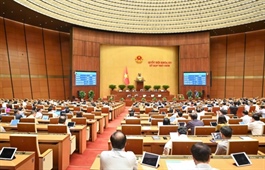Agricultural firms seek policy to utilise new resolution
Agricultural firms seek policy to utilise new resolution
As part of Vietnam’s overarching vision on private sector development, agriculture leaders are expected to review, revise, and advance the sector.
In mid-May, the government issued an action plan to accompany Resolution No.68-NQ/TW on the private sector development. As part of the action plan, the Ministry of Agriculture and Environment (MoAE) is assigned to review and revise the Land Law and its implementing documents, supplementing policies to control fluctuations in land prices, particularly for land used for industrial and non-agricultural production.
The ministry has to assign local authorities to allocate land for investment in infrastructure for industrial parks, clusters, and technology incubators for lease to high-tech enterprises, small businesses, and innovative startups, as well as provide land rental support for such entities.
The MoAE is also assigned to complete the development of the National Land Database and its integration with the national data centre and other related databases, and issue regulations on the management, operation, and utilisation of the national land database.
Revisions on the Law on Environmental Protection will also include policies for state-supported interest rates for enterprises borrowing to implement green and circular economy projects and to adopt the environmental, social, and governance framework.
This directive is highly significant for agricultural enterprises. Tran Manh Bao, chairman of the Vietnam Seed Trade Association, stated, “This directive is extremely important because, for seed research and development activities in particular, land is the foundation of agricultural production and a prerequisite for enterprises to develop, research, and test production.”
However, access to land remains challenging, with prolonged procedures and a lack of a specific legal framework for science and technology enterprises using land for research, testing, breeding, and production. This hinders many enterprises from expanding, Bao added.
To bring Resolution 68 to life and make it a true driving force for the national economy, Bao made several suggestions.
“Firstly, the state should promptly develop and issue specific mechanisms for science and technology enterprises in agriculture, covering land, credit, taxes, and training,” he said. “Alongside revising the Land Law, there should also be a review of the Crop Production Law to ensure alignment with other laws. We should also establish innovation support funds, prioritising private enterprises with research and application capabilities.”
The priority is to institutionalise resolutions into specific, highly feasible policies to achieve practical results aligned with set objectives.
Other agricultural firms also agree that Resolution 68 not only brings hope but also, for the first time, establishes a strategic national position for private agricultural enterprises. They also proposed specific recommendations for promptly issuing preferential policies on capital, land, taxes, and technology for enterprises involved in building raw material supply chains.
“We suggest that when issues or obstacles arise during implementation, ministries, sectors, and the government will address and resolve them quickly,” said Mai Kieu Lien, CEO of Vinamilk, at a national dialogue on the issue at the end of May. “For enterprises, seizing opportunities can propel them forward by five or 10 years, but missing them could set them back by 50 years.”
At Vinamilk, issues raised from lower levels to the general director must be resolved within 48 hours by the final decision-maker.
“For the government, there could be a specific timeframe for resolving issues from the moment they arise,” Lien added. “If these issues are addressed, it would be like clearing a blocked water flow, where there’s a blockage, progress halts, but when cleared, development can thrive.”
- 10:59 17/06/2025























